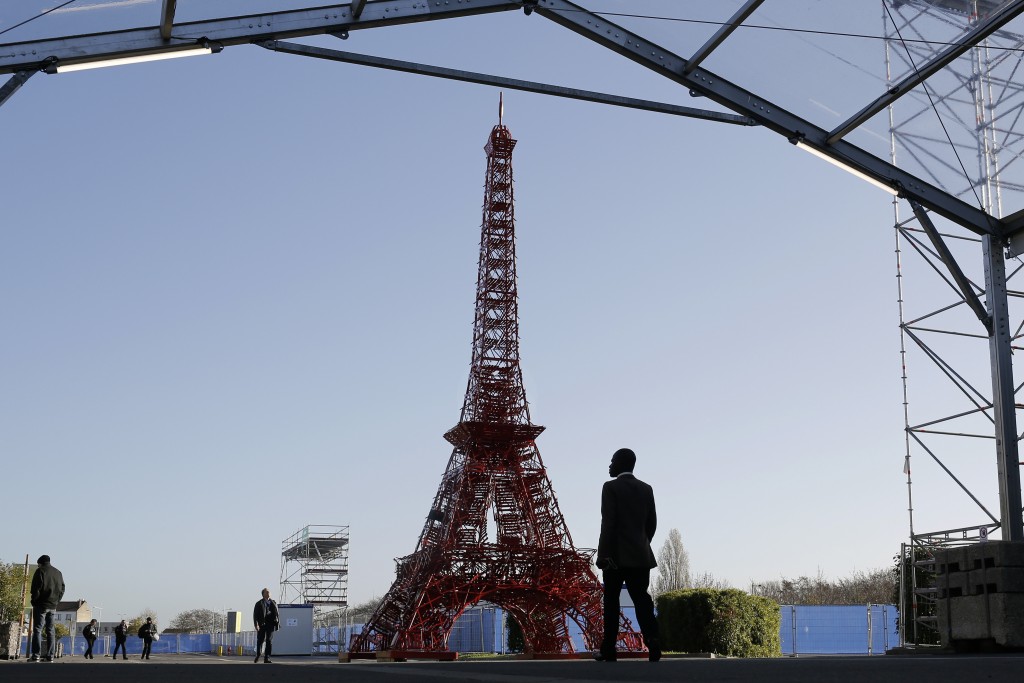
People walk in front of a reproduction of the Eiffel tower at the United Nations Climate Change Conference in Le Bourget, outside Paris, Saturday, Nov. 28, 2015. AP FILE PHOTO
As the United Nations announced plans to fast-track ratification of the Paris Agreement on climate change, President Duterte said he would not honor the country’s “crazy” commitment to severely cut greenhouse-gas emission, as it would limit industrial growth.
Poor countries such as the Philippines should be allowed to pursue industrialization to improve the lives of their people, Duterte said in a series of speeches during a visit to Mindanao on Friday.
“If you will not allow us to reach parity, [while industrialized countries] are already there and we are still here, then I’m saying that’s crazy. I will not agree to that,” Duterte said, adding that he “plans to put up industrial zones everywhere,” with China as an “easy market” for such a move.
Congress, he said, is already reviewing the treaty.
The international deal aimed at curbing emissions was signed in Paris in December last year, but only 19 countries, including France and island-states threatened by rising sea levels, have so far ratified the agreement.
It cannot become effective until 55 countries accounting for 55 percent of global greenhouse-gas emissions have fully approved it.
Vulnerable
“There is no treaty to honor. We have not signed the treaty,” Duterte said, according to transcripts of his comments released by Malacañang yesterday.
The reversal in the country’s position on the treaty drew concern from climate experts and local activists who have seen worsening typhoons and other extreme weather conditions in recent years. The Philippines is considered one of the world’s most vulnerable to climate change impacts.
Climate scientist Rosa Perez appealed to the President to reconsider his position, and discuss the pact and negotiation process with government officials and climate experts.
“His statement was an indication that he is not well informed of the importance of the climate change negotiations and the country’s position in the whole process. I hope everything will turn out well for the country’s good,” said Perez, a member of the Intergovernmental Panel on Climate Change, an independent body of climate scientists.
Indigenous peoples
UN special rapporteur on the rights of indigenous peoples, Victoria Tauli-Corpuz, agreed with Perez, saying that the Paris Agreement could be used to protect not only the communities in disaster-prone areas in the Philippines but also the rights of indigenous peoples.
“It is unfortunate that President Duterte rejected the Paris Agreement,” she said, adding that while the treaty has its weaknesses, its commitment to respect human rights, including indigenous rights, is important.
Last December nearly 200 nations, including the Philippines, adopted the new climate agreement, which aims to transform the world’s fossil-fuel-driven economy within decades and slow the pace of temperature rise to “well below” 2 degrees Celsius (3.6 degrees Fahrenheit), and 1.5 degrees Celsius if possible, compared with preindustrial levels.
The new deal was originally slated to take effect in 2020, but Christiana Figueres, who stepped down this month as the United Nations’ lead climate official, has said she thinks the deal could come into effect early, by 2018.
Lucille Sering, the former vice chair of the Philippines’ Climate Change Commission, said the country’s commitment to cut by 70 percent its greenhouse-gas emissions by 2030 was conditional on sufficient international resources, technology and training being made available to the country.
Renewable energy
Naderev Sano, Greenpeace’s executive director for Southeast Asia, said an industrializing country like the Philippines need not be dependent on fossil fuels, and can instead turn to renewable energy and sustainable forms of development.
“Solving climate change does not have to be incompatible with social and economic development. Climate solutions will not constrain our development,” he said.
Francis de la Cruz, an energy policy specialist at the Institute for Climate and Sustainable Cities, said it was crucial for the country to engage in the climate deal to ensure the agreement wpuld “benefit vulnerable countries most.”
The Philippines is the current leader of the Climate Vulnerable Forum, a group of 50 countries that suffer most from the impacts of climate change.
“It is important to clarify that when the Philippines signed up to the Paris Agreement, it was primarily driven by the interests of vulnerable countries to create a resilient future for our people,” De la Cruz said. Reports from Thomson Reuters Foundation and AFP/TVJ
RELATED STORIES
Duterte lauded for ‘articulating what’s wrong with climate talks’
Int’l aid agency urges Duterte to honor Paris climate pact